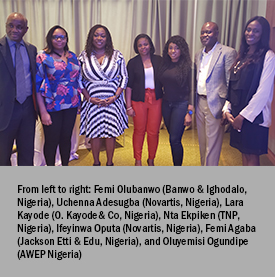African Continental Free Trade Agreement Impacts Brands’ IP Protection
Published: April 15, 2020
Nta Ekpiken The New Practice Lagos, Nigeria
 For brand professionals, there is now more than ever the increased need to acquire knowledge on the various systems in Africa for registering and protecting clients’ intellectual property (IP). Indeed, today, micro, small, and medium-sized enterprises (SMEs and MSMEs) face a number of challenges, such as enforcement, border controls, and product identification while trading across their borders.
For brand professionals, there is now more than ever the increased need to acquire knowledge on the various systems in Africa for registering and protecting clients’ intellectual property (IP). Indeed, today, micro, small, and medium-sized enterprises (SMEs and MSMEs) face a number of challenges, such as enforcement, border controls, and product identification while trading across their borders.
With this in mind, local INTA member The New Practice hosted an INTA roundtable in Lagos, Nigeria, on the benefits of IP protection under the African Continental Free Trade Agreement. The main objective of the agreement is to create a single continental market for goods and services, for the free movement of business persons and investment. It will also expand intra-African trade through the harmonization of trade liberalization across Africa.
The roundtable, which took place on February 21, provided the Nigerian IP community with the opportunity to discuss the implications of the agreement from a practitioner and brand owner perspective. Participants talked about the opportunity for local brands and SMEs to reach out to new markets, improving their branding strategy, and to rely more on trusted practitioners.
Twenty-five stakeholders attended the roundtable. Lara Kayode (O. Kayode, Nigeria) introduced INTA, Uche Nwokocha (Aluko & Oyebode, Nigeria) gave opening remarks, and Femi Olubanwo spoke on behalf of the Intellectual Property Lawyers Association (IPLAN).
Participants at the roundtable resolved that:
- Nigerians need to take advantage of the raw materials prevalent in Nigeria to explore and exploit the opportunities that the agreement holds;
- There is the need to build a bridge between consumer associations and community development groups to educate SMEs and MSMEs on the agreement and similar future agreements;
- INTA should hold training sessions to train SMEs and MSMEs on how to take advantage of opportunities inherent in the agreement;
- There is the need to train SMEs and MSMEs on sustainable growth;
- Pressure groups and organizations should lobby government institutions;
- IPLAN should constitute a Policy and Advocacy Committee tasked with verifying the status of agreements-such as the African Continental Free Trade Agreement-and also communicate the positions of such lobby groups;
- IP associations in Nigeria should partner with organizations to lobby and infuse the opinions in policies of such agreements;
- IP associations in Nigeria must increase their participation in negotiating and advising national representatives in positions of authority prior to the signing of similar international agreements.
© 2020 International Trademark Association
This website uses cookies so that we can provide you with the best user experience possible. Cookie information is stored in your browser and performs functions such as recognising you when you return to our website and helping our team to understand which sections of the website you find most interesting and useful.
To find out more please see our Cookies Policy and Privacy Policy.
These cookies are used to identify a user’s browser as the visitor goes from page to page on the Site. These are session cookies, which means that the cookie is deleted when you leave the Site. It is an integral piece of the Site software and used to let the server know which users are on the Site at any given time and make certain parts of the Site easier to use.
|
|
If you disable this cookie, we will not be able to save your preferences. This means that every time you visit this website you will need to enable or disable cookies again.
These cookies are used to collect information about how visitors use our Site. The cookies collect information in anonymous form, including the numbers of visitors to the Site, where visitors have come to the Site from, the pages they visited and how they have interacted with tools on the Site like search and embedded media players. We use the information to compile statistical reports of our users’ browsing patterns so that we can improve the Site.
|
|
Please enable Functionality Cookies first so that we can save your preferences!
These cookies are used to deliver advertising relevant to the interests of visitors to our Site. They are persistent, which means they will remain on your device after you leave the Site.
- Facebook (Ad Pixel)
- Google (Ad Pixel)
- LinkedIn (Ad Pixel)
- Quattro Anonymous
Please enable Functionality Cookies first so that we can save your preferences!
